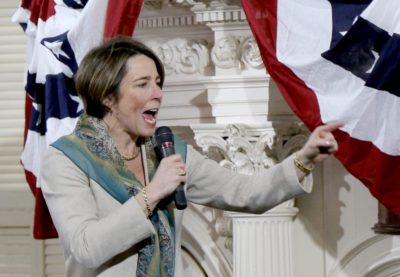
Gun legislation has been a hot political topic for several years, and with the recent shooting in Las Vegas and act of terror in New York City, Massachusetts leaders are taking action.
A team of researchers at Northeastern University published a report Friday analyzing the implementation of a bill signed into law in August 2014 designed to reduce gun violence, An Act Relative to the Reduction of Gun Violence.
Despite concerns that legislation targeting gun violence restrict constitutional freedoms, the report found the state law did not affect the ability of law-abiding citizens to obtain firearms.
The findings suggest tougher gun laws, at least in Massachusetts, did not lead to a significant increase in gun license denials, according to the report. Only about two to four percent of those who applied for gun licenses were denied them.
That means 97 percent of people who applied for a license since the law passed were granted one, according to the report.
Still, the authors of the report “recommend a continued assessment … of the new gun law in order to ensure that the provisions continue to direct efforts towards the reduction of gun violence in the Commonwealth of Massachusetts,” according to the report, and the state is continuing to crack down on gun violence.
Massachusetts Attorney General Maura Healey along with 16 other attorney generals, signed a letter Oct. 22 challenging a federal proposal which would strengthen interstate concealed firearm policies.
The proposal, called the Concealed Carry Reciprocity Act of 2017, would make it easier for “qualified” individuals to carry concealed handguns from state to state.
The attorneys general argue the legislation harms residents who have been safely policed under varying state laws by allowing “potentially dangerous or irresponsible non-residents with concealed weapons in the states, cities and towns across America that have made local judgments that certain regulations on the carrying of such weapons are necessary to protect public safety,” the letter states.
Mike Gildesgame, a member of the Massachusetts Coalition to Prevent Gun Violence, wrote in an email that the legislation, if passed, could cause an increase in gun deaths throughout the country.
“I agree with the [attorney general] on this issue as do many in the law enforcement community,” Gildesgame wrote. “The proposed legislation will in no way help to limit gun deaths; on the contrary, it has the strong potential to increase homicides and suicides with the proliferation of guns the legislation could allow.”
Gildesgame wrote the language of the bill would overshadow local and state regulations on firearms, such as those in Massachusetts.
“The proposal doesn’t really strengthen or weaken the second amendment’s language about the right to bear arms but it would appear to abrogate certain state laws restricting the ownership and use of firearms,” Gildesgame wrote.
The letter came days after a Boston University study associated more lenient concealed handgun permits to higher rates of homicide, The Daily Free Press reported.
Jeffrey Berry, a professor of American politics and political behavior at Tufts University, said he’s not optimistic the law will have a positive impact on the nation.
“It’s not going to going to fix the problem of gun violence, which is too pervasive,” Berry said. “Even if you solve it in Massachusetts, it’s still going to go on in 49 states.”
Several Boston residents said they agree with Healey’s decision to challenge the bill.
Laura Peters, 24, of Allston, said the emotional well-being of society is of the utmost importance and therefore guns overall shouldn’t be permitted to residents.
“I don’t think anybody should have guns,” Peters said. “I think it’s unnecessary, it’s dangerous and it’s scary. People don’t understand the importance of mental health, especially right now.”
Latoya Rogers, 41, of Allston, said she moved to Allston due to the prominence of gun violence in her former neighborhood of Dorchester.
“With all the gun violence that happening here, I’d be opposed to [the Concealed Carry Reciprocity Act],” Rogers said. “There are many guns on the street now…That’s why I moved out of Dorchester and into Allston — I have a 16-year-old son, so I didn’t want him in that environment with all of that going on.”
Amber Watson, 22, of Allston, said she thinks people in the United States shouldn’t be able to carry firearms to begin with.
“This doesn’t make any sense at all,” she said. “It’s not 1775 anymore – there’s no reason for certain gun laws to be in place. There’s no reason to have automatic or concealed weapons.”